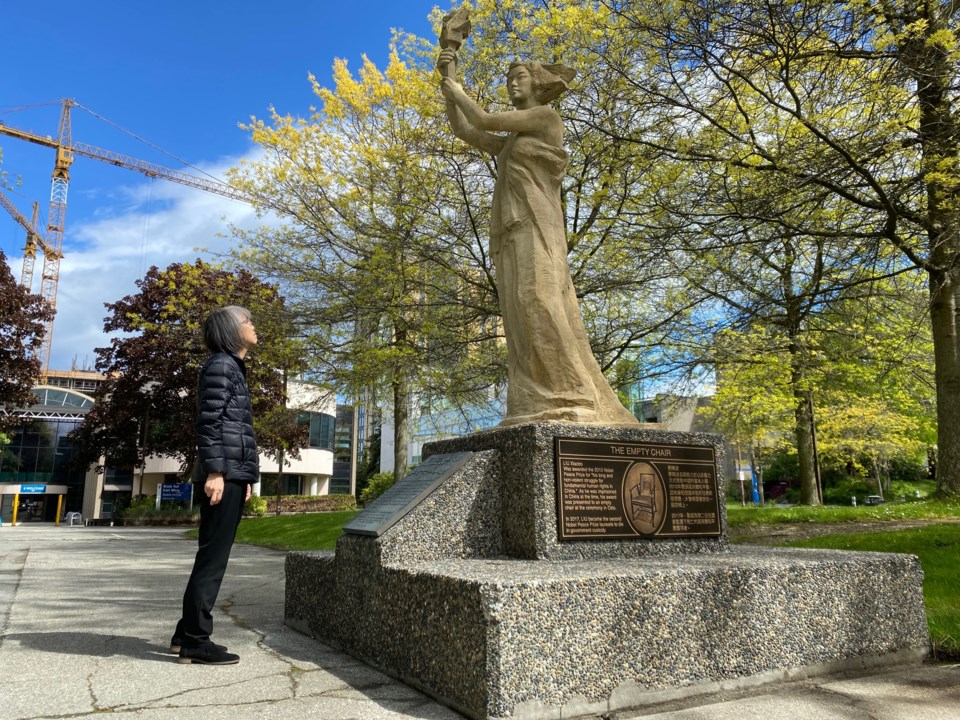Positioned between the University of British Columbia's main study hall and the bus loop rests an ageing relic of a historical moment that has shaped modern Vancouver.
It is statue.
Few students may take the time to acknowledge the robed lady holding a torch on their busy route to classes. Still, every year, in the week leading up to June 4, locals with Hong Kong connections gather to commemorate the goddess. The latter memorializes pro-democracy students killed by the People's Liberation Army in Beijing's Tiananmen Square in 1989.
The stone statue is weathered, but a recent cleaning by volunteers perhaps indicates its renewed meaning, as Hong Kong's democratic institutions continue to fall under the expansive authority of the Chinese Communist Party.
Members of the Vancouver Society in Support of Democratic Movement will lay a wreath at the statue . On June 4, they intend to protest outside China's consulate compound at 3380 Granville St. with a .
Group leader Mabel Tung is an annual attendee and organizer who sees the coming years as pivotal for remembering the events of June 4, 1989, known as the Tiananmen Square Massacre and best remembered around the world by "Tankman," an unknown man who stepped in front of a line of tanks in the square.
The statue is a replica of the original goddess created by Chinese art students in 1989 and rolled into the square only for it to be destroyed by soldiers.
Information about the event is suppressed in China by authorities, says Tung.
"We make sure our hope is still there. It's been happening in China for 34 years — no one can say something about June 4. Right now, they say May 35 as representing June 4. Because they try to erase June 4. Young people in China, they don't know what happened June 4 because their parents didn't want them to know. They would be in trouble if they talk about that in Mainland China," said Tung.
Commemorating the event in Hong Kong at Victoria Park is now banned, and authorities have been jailing people under China's national security law for any mention of it.
Tung explains that the communist regime is afraid of June 4.
"They try to erase history," said Tung. "So, they try to erase any image related to June 4 because Hong Kong is the one city in the world that still remembered June 4 every year with a candlelight vigil. Almost 200,000 people in the park …and now it's gone. So we have to keep the spirit here."
Tung said she would never have thought June 4 Hong Kong vigils would be banned in 2022 because the city was supposed to have autonomy for 50 years from the 1997 handover, according to a 1984 declaration signed by Britain and China.
The statue is also important for Vancouver, she said, because many immigrants and international students from China have been "brainwashed" into believing the regime's propaganda, which denies the event even happened.
Tung was recently heartened by one recent student from the People's Republic of China who learned about the statue.
"She came to our event and said now I know what happened," she said.
But, said Tung, "some of the students don't believe it though. They think it is propaganda from a foreign country and trying to attack China. It's hard to change."
The statue was erected in 1990 at the university after pro-Beijing groups, such as the Chinese Benevolent Association (CBA), opposed its placement in Chinatown or elsewhere in the city.
The CBA remains steadfast in supporting Beijing policies. in support of the national security law, which members claim is a result of "radical terrorists" who "have seriously endangered the social stability of Hong Kong."
To this day, CBA leaders claim there is contradictory information about what happened in Tiananmen Square.
The historic event is considered a turning point, along with the administrative handover, that led to a significant movement of Hong Kong citizens to Vancouver. Between 1987 and 1997, 225,000 people emigrated from Hong Kong to Canada, according to a Statistics Canada website outlining the biggest immigration waves in history.
In 2020, pro-democracy activist, Ivy Li, told Glacier Media that could also help non-Chinese people better understand the shared values of much of the Chinese diaspora here in B.C.
"Not only did their arrival form an important part of Canadian history, (but) they have shown a strong desire to be free and to live with dignity," said Li.

